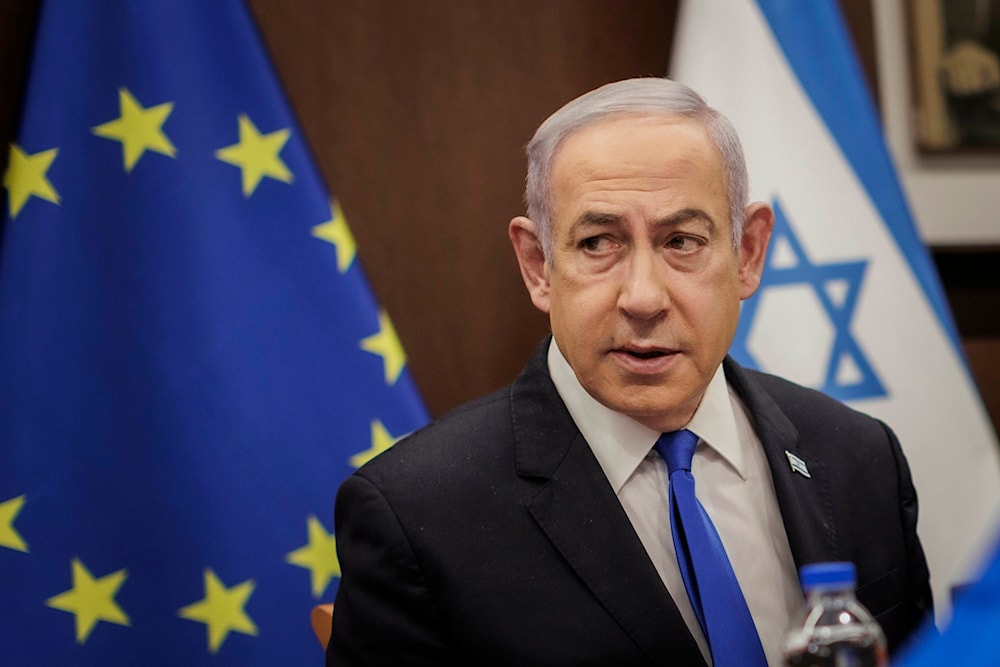UK turns down Israeli request to prescribe IRGC as 'terrorist'
David Cameron believes it is preferable if London could continue to communicate with Tehran.
-

Israeli Prime Minister Benjamin Netanyahu is seen during a meeting in "Israel" on April 17, 2024. (AP)
UK Foreign Secretary David Cameron informed Benjamin Netanyahu that Iran's Islamic Revolution Guard Corps (IRGC) will not be designated as a "terrorist" organization, The Telegraph reported.
A senior Whitehall source divulged that Cameron personally delivered the message to Israeli Prime Minister Benjamin Netanyahu and Foreign Minister Israel Katz.
Both are said to have encouraged Cameron to take the action when they met in "Israel" on Wednesday, claiming that Iran's retaliatory attack on "Israel" demonstrated its need.
Cameron is understood to have strongly objected, claiming that it would be preferable if London could continue to communicate with Tehran. "He was pretty blunt," the source reported.
The Foreign Secretary maintained that the Iranian Foreign Minister is "no friend of the British Foreign Secretary or vice versa," but cited that there must be an ability to communicate, adding that "if we proscribed them, it would not help the situation.”
Following Iran's retaliation this weekend, some prominent Tories have repeated their call for the Islamic Revolutionary Guard Corps, a part of the Iranian military, to be formally recognized as a "terrorist" organization, making it illegal to join the IRGC, attend its meetings, wear its insignia in public, or promote support for its actions.
The government has been debating the idea for more than a year, with Home Office ministers previously supporting it but the Foreign Office opposing the change, worrying it would cut off a valuable route of communication with Iranian leaders.
Some US government figures, who previously proscribed the IRGC during Donald Trump's presidency, also believe maintaining ties with Iran is helpful.
US, UK sanction Iran over its retaliatory attack on 'Israel'
Despite the UK's rejection to designate the IRGC as "terrorist", it still imposed sanctions on several of its bodies.
The United States and Britain announced widespread sanctions against Iran's military drone program on Thursday, in response to its weekend retaliatory attack against Israeli targets in occupied Palestine.
"Today, we are holding Iran accountable -- imposing new sanctions and export controls," US President Joe Biden said in a statement.
Washington's sanctions target 16 people and two companies reportedly involved in Iran's unmanned aerial vehicle (UAV) program, as well as components for the drones used in the Saturday attack, according to the Treasury Department.
In coordination with the US Treasury, the UK government also announced sanctions against Tehran on Thursday, targeting seven individuals and six companies for allegedly enabling Iran to continue what it described as "destabilizing regional activity, including its direct attack on Israel."
British Prime Minister Rishi Sunak said the UK had sanctioned the "ringleaders of the Iranian military and forces responsible for the weekend's attack."
The announcement came following British Foreign Secretary David Cameron's arrival from a recent trip to "Israel" where he met with Israeli occupation Benjamin Netanyahu.
Alongside its sanctions against Iran's UAV program, the US also targeted five companies providing parts for Iran's steel industry, and an automaker allegedly involved in providing "material support" to Iran's Islamic Revolution Guard Corps (IRGC).
"Iran's metals sector generates the equivalent of several billion dollars in revenue annually, with the majority coming from steel exports," the Treasury Department said.
"We will continue to deploy our sanctions authority to counter Iran with further actions in the days and weeks ahead," US Treasury Secretary Janet Yellen confirmed in a statement.

 4 Min Read
4 Min Read








